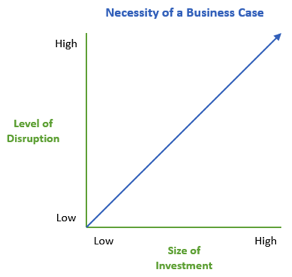Do you use a business case as part of your sales process? If not, you should seriously consider it, because any solution-based or consultative-based sale will benefit from providing buyers with the business case.
This is a change from ten or twenty years ago, when the economy was good and customers were willing to sign off on purchases without putting sales and marketing teams through the wringer to show value and justify their price. Today, however, most B2B customers have made a permanent shift to requiring a business case. Because customers are now only talking with salespeople at the very end of the sales cycle when they are ready to make a decision, the days of being able to “wing it” with a presentation or proposal and still win are over.
How can you tell if you need a business case? Here are two elements you need to consider.
- How much will your offering change/disrupt your customer’s business?
- How much will the customer need to invest to purchase and implement your offering?
What do we mean by a change that disrupts a customer’s business? Ask yourself how much your offering will require your customer to change they way the operate in terms of their people, their processes, and their technology.
For example, if you’re selling a new payroll system, it would not necessarily be a disruptive change because it won’t really affect the way very many people do their jobs. By contrast, if you’re selling a CRM solution that will displace an existing legacy system, that would represent disruptive change because it will affect many people and a variety of operational processes, as well as the customer’s existing technology. In this case, as the disruptive nature of the solution increases, the likelihood of needing a business case goes up as well.
Even a relatively expensive purchase may not need a business case if the level of disruption is low. For example, say you are an aluminum supplier and represent a lower-cost alternative to a customer’s existing aluminum supplier. Even though this change might represent a six-figure sale for you, it won’t cause any major disruption to the way the customer currently operates and thus may not require an in-depth business case. The customer will want references to gain confidence that you will deliver a product that meets their spec and delivery expectations — but they might not want to see anything else to make the decision to buy from you.
Here’s a breakdown of to evaluate your offering and determine whether or not you need a business case:

The likelihood that you will need a business case to close a deal grows as both the level of disruption and size of investment grow. In these situations, make sure you’re prepared to help your customer with a business case or provide them with one. The worst thing to do is leave it to your customer or competitor to fill the void.
In two upcoming posts we’ll explore: 1) How to figure out what type of business case works best for you, and 2) How to overcome common objections from CFOs about your business case.

[Image via Flickr / Dennis Brekke]














